How to Get Rid of Musty Smell in Old House
10 House Smells You Should Never Ignore
Your nose is more sensitive than some of the most sophisticated scientific equipment. Use it to sniff out these serious home dangers.
Every editorial product is independently selected, though we may be compensated or receive an affiliate commission if you buy something through our links. Ratings and prices are accurate and items are in stock as of time of publication.
 AndreyPopov/Getty Images
AndreyPopov/Getty Images
Use common scents
Home safety is a serious issue, whether you have a gigantic house or a tiny one. There's a whole lot going on in modern-day homes, and even the savviest homeowners need to be wary of these hidden home dangers you should never ignore and the things in your home that can be a fire hazard. Luckily, sometimes you can be warned and stop a home catastrophe before it happens, simply by identifying a foreboding smell. Here are the noteworthy odors that you'll want to be on high alert if you notice, what they could mean, and what you should do.
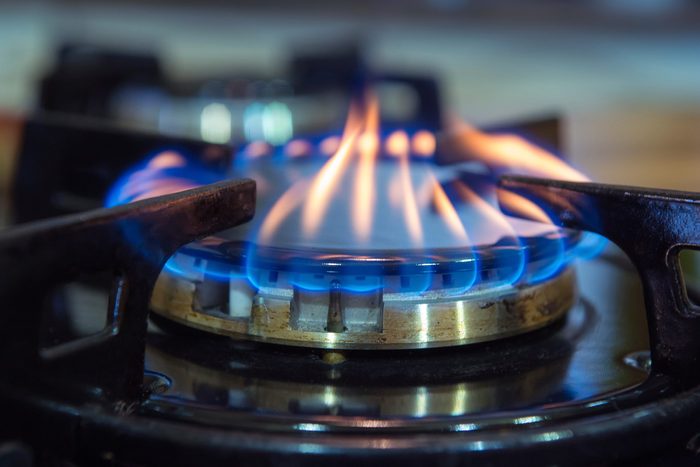 istock/FotoCuisinette
istock/FotoCuisinette
Gas smell in house
Natural gas is odorless, so in order to make it detectable, the chemical mercaptan is added, which creates that classic "rotten egg" odor. If you smell a rotten egg smell in your house, you could be in danger of a gas leak, which could cause fire or an explosion. Leave the house immediately and call the gas company on your mobile phone or a neighbor's phone, says Frank Lesh, executive director of the American Society of Home Inspectors. Avoid using a landline phone in the house, turning lights or appliances on or off, or using a car, all of which could create sparks. Don't miss more things every homeowner needs to know.
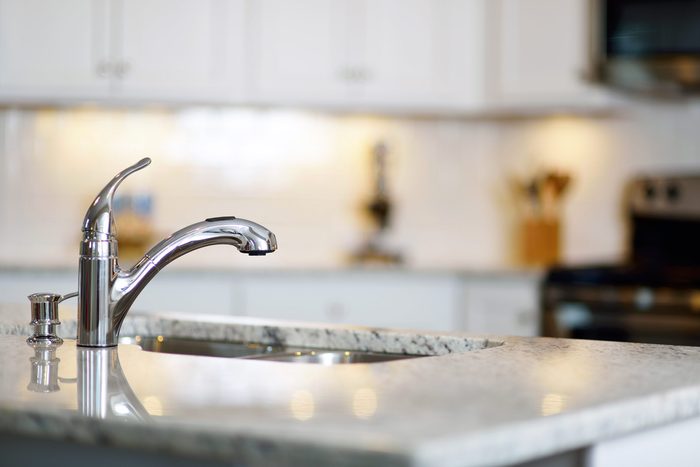 istock/EricVega
istock/EricVega
Musty smell in house
A musty, pungent odor could indicate a sink leak or broken pipe that has given rise to mold, which loves to grow in dark, damp spots. "For mold, we're really concerned about people with allergies and asthma," says David Dyjack, DrPH, CIH, executive director of the National Environmental Health Association. "Both conditions can be exacerbated by mold exposure." If you see mold, disinfect non-porous surfaces like tile with a 10 percent bleach/water solution and let sit for ten minutes while ventilating, Dyjack adds. For porous surfaces like drywall, it's best to replace. If you can't see the mold it may be in the walls, in which case call your local health department or a home inspector (the American Society of Home Inspectors website provides listings based on area code), to find the problem. Plenty of home inspector nightmares start with a smell in the house.
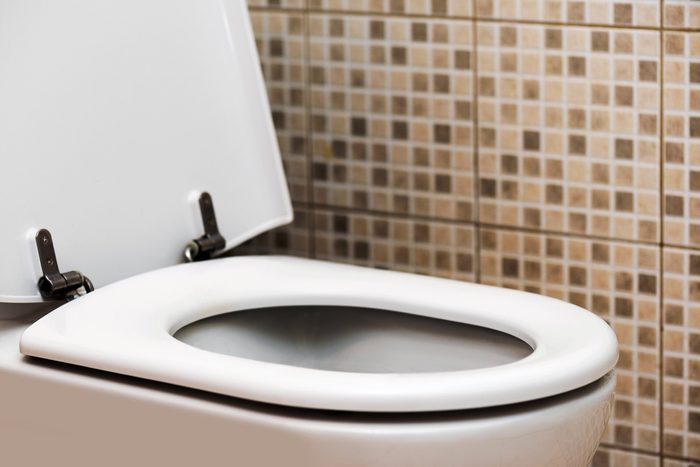 istock/omersukrugoksu
istock/omersukrugoksu
Gross bathroom smell in house
If your home smells like a waste treatment plant, you could have a leak of sewer gas, which contains toxic and potentially explosive components such as hydrogen sulfide (which could cause problems from eye irritation to unconsciousness) and methane (which can deplete oxygen leading to asphyxiation). One cause could be a bathroom that isn't used often. The pipes under a shower or sink include a U-shaped trap, which holds a small amount of water that blocks sewer gas from leaking back into the house. If a bathroom isn't used, this water could evaporate, allowing odors through. To fix the problem, simply pour a cup of water into the bathroom drain, says Lesh. For extra effectiveness, add a teaspoon of vegetable oil to stop the water from evaporating. If, however, you can't find the source of the problem, the issue could be that a vent pipe, which routes sewer gas up and out through your roof, is broken or clogged. In this case, call a home inspector or plumber to investigate. Check out more secrets home inspectors won't tell you.
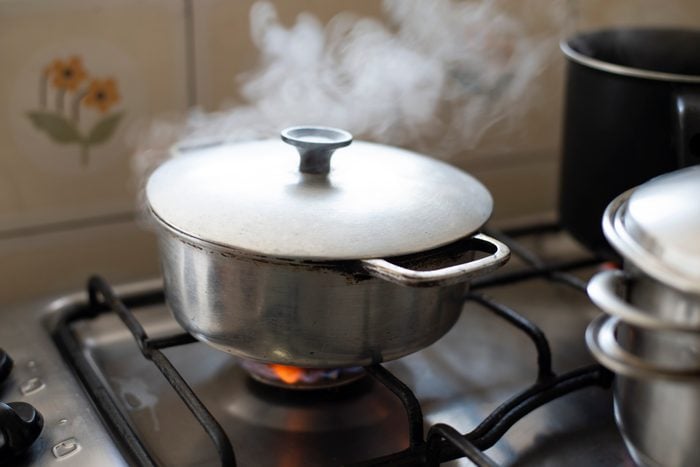 Celso Pupo / EyeEm/Getty Images
Celso Pupo / EyeEm/Getty Images
Smoke-like smell in house
A strong smoke smell could be cause for panic, but even a small, occasional whiff could mean a big problem. "If you only smell it once in awhile, like when using a particular light or appliance, it could be electrical smoke behind a wall or in a ceiling light fixture—and that could be very dangerous," says Lesh. Call your fire department or an electrician right away. To avoid this issue in the future, all smart homeowners do these things once a year.
 Boris SV/Getty Images
Boris SV/Getty Images
Fishy smell in house
Picking up a fishy odor in your home, but don't remember buying any seafood? This could be a sign that an electrical fixture, likely an appliance, in your home is overheating. The "fishy" or potentially acrid smell may mean that the plastic, rubber, or another material around the afflicted appliance is melting. If you ignore this for too long, it could cause a fire. To identify the source, use your sniffer to try to identify where it's coming from. If it is indeed an appliance, you should probably call a repair expert, who will determine if the appliance is fixable or needs to be replaced. If it seems to be coming from an outlet or switch, you'll want to shut off your circuit breaker and then call a pro. Plus, watch out for these ways you're shortening the life of your appliances.
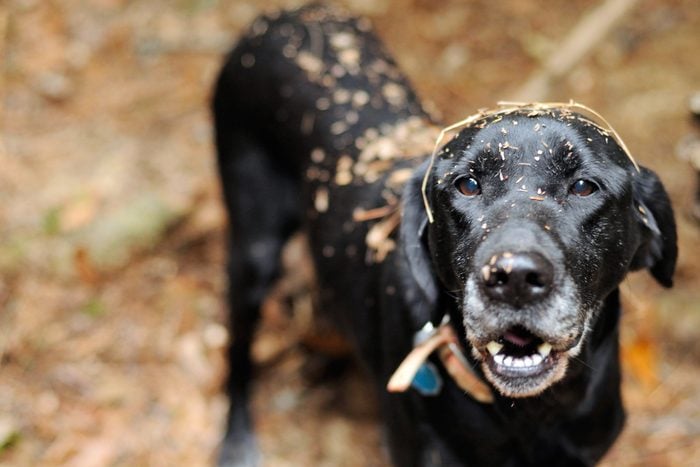 istock/sshepard
istock/sshepard
Dirty dog smell in house
If you notice a raunchy, wild smell like a dog in need of a bath—but you don't have a dog—you could have rodents, raccoons, or squirrels in your attic. These squatters will use your rafters as a bathroom, which is especially dangerous with raccoons, whose feces could contain roundworm eggs that pose a risk to people, according to the CDC. If you find feces in your attic, "don't be a hero and just try to pick them up," warns Lesh, who suggests calling a pest control expert to ensure safe removal. If you do have a dog that stinks, however, these are the easiest ways to get rid of pet odor.
 Angkul Sungthong / EyeEm/Getty Images
Angkul Sungthong / EyeEm/Getty Images
Old cigarette smell in house
We've all heard of secondhand smoke, but there are newly emerging concerns about thirdhand smoke, which is the smell of old smoke that lingers, such as in a hotel room or vacation rental previously occupied by smokers. "With thirdhand smoke, the particles associated with the combustion of tobacco have settled onto surfaces, including counters, tabletops, and bed linen, and there are at least 11 carcinogens associated with some of that dust," says Dyjack. "We don't know how significant thirdhand smoke exposure is, but kids are at greatest risk by rolling on the carpet, touching tables, then sticking their fingers in their mouths." Dyjack recommends thoroughly cleaning places where smokers have been. Try one of these simple deodorizer ideas to make your home smell fresh.
 marketlan/Getty Images
marketlan/Getty Images
Ammonia smell in house
Or, as it might be more colloquially identified, "cat pee." If you don't clean with ammonia or own a cat, this unpleasant metallic smell is one you shouldn't ignore. Even if youdoclean with ammonia, or use an ammonia-based coolant, this could be a danger because the smell could mean it's leaking. Especially if you have older appliances that might use ammonia as a coolant, you'll want to give them a smell to see if they could be the source. But an ammonia smell could also be indicative of other things, like a critter that died in your walls (yuck!) or even mold. If itisa dead rodent, it's not necessarily dangerous, but a sign that you'll want to tackle a pest problem. Here's what to do about a mouse in your walls.
 istock/Manuta
istock/Manuta
That great "new" smell in house
If you're giving your walls a facelift, be on guard for the "fresh" smell of paint, which contains volatile organic compounds (VOCs). Because VOCs can cause health problems that range from throat irritation and headache to central nervous system damage and cancer, according to the Environmental Protection Agency, buy low- or no-VOC paint brands and ventilate during and after painting. VOCs are also found in insecticides, which Dyjack predicts may be in wide use due to fears of the Zika-carrying Aedes mosquito. Instead of coating your home with spray, Dyjack says, carefully follow the directions on the can. Or better yet, eliminate the things that attract the mosquito in the first place by removing any small, quarter-sized pools of water in your home and yard. Don't miss these clever hacks to make everything in your home smell amazing.
 John Keeble/Getty Images
John Keeble/Getty Images
Sweaty "gym smell" in house
No one, not even the biggest home gym enthusiast, wants their home to smell like a locker room. If you're picking up a sweaty stench, and you've ruled out all the usual culprits, you could be looking at bacteria growth in your HVAC system. Specifically, during the fall and spring months when temperatures are changing, the condensation sometimes becomes an environment for bacteria to grow. If this is happening in your home, you should probably either call an HVAC expert or use a cleaning product specifically designed for HVAC coils. Next, watch out for these silent signs your home is an unhealthy place to live.
Sources:
- Today's Homeowner: "8 HOME SMELLS THAT COULD BE SIGNS OF DANGER"
- Bob Vila: "If Your Home Smells Funny, Check These 8 Problem Areas"
- OdorKlenz: "How to Neutralize Ammonia Smell in a Home"
Originally Published: April 05, 2021
Sign up for articles sent right to your inbox
Enjoy the best stories, advice & jokes delivered right to your inbox!

Subscribe & SAVE Save Up To 84%!
How to Get Rid of Musty Smell in Old House
Source: https://www.rd.com/list/smell-in-house/